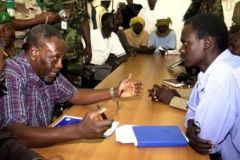Darfur rebels pledge unity to break talks deadlock
Nov 28, 2005 (ABUJA) — Rival rebel leaders from the Sudanese region of Darfur sounded a rare note of unity on Monday as they worked on a common negotiating position for the seventh round of peace talks with the government.
 Minni Arcua Minawi and Abdelwahed Mohamed el-Nur, who both claim to be chairman of the Sudan Liberation Army (SLA), said they would put on hold infighting that has held back progress in previous rounds of peace talks in the Nigerian capital.
Minni Arcua Minawi and Abdelwahed Mohamed el-Nur, who both claim to be chairman of the Sudan Liberation Army (SLA), said they would put on hold infighting that has held back progress in previous rounds of peace talks in the Nigerian capital.
“I don’t want to make any competition here because our people on the ground need us to remain united. Any division and the only winner is the government of Sudan,” Nur told Reuters in Abuja, where the talks are due to start on Tuesday.
Minawi, who boycotted the previous round and whose participation is seen as crucial because he commands loyalty from many fighters in the field, had a similar message.
“We are going to enter the talks with one delegation … I came here because I hope this should be the final round,” he told Reuters.
The newfound quest for rebel unity also stretched to include the smaller Justice and Equality Movement (JEM), which will be part of the joint negotiating position.
“We in JEM think that the unification of these two groups (the Minnawi and Nur factions) will help the process go forward and will help us all together to achieve the goals of our people,” said JEM chief negotiator Ahmed Tugod.
The rebels said they were eager to start discussing the issues of wealth-sharing, power-sharing and security that lie at the root of the Darfur conflict, which has killed tens of thousands of people and displaced more than 2 million into makeshift camps in the vast desert region.
VIOLENCE ON THE GROUND
Many observers are downbeat about the talks, citing not only rebel infighting but also doubts about how serious the government would be about implementing any agreement, and an upsurge in violence in Darfur in the past two months.
But the African Union (AU), which has 6,000 peacekeepers in Darfur and is the main mediator in the Abuja peace talks, said the closing of rebel ranks would offset the deteriorating situation in the western Sudanese region.
“The security situation does have an impact on the negotiations because it creates a climate of mutual distrust, and it’s difficult to deal with the parties when they are in that mode,” AU mediator Sam Ibok told Reuters.
“So what we are trying to do is two-pronged. While we are attending to the security situation and saying to the AU in Darfur to do everything they can to stabilise it, we are also trying not to replicate the problem here in Abuja,” he said.
The rebels said one element that could help progress in the talks was the participation, on the government side, of members of the Sudan People’s Liberation Movement (SPLM), a former rebel group from southern Sudan.
The SPLM reached a peace settlement with Khartoum in January after more than two decades of war — a separate and bloodier conflict than the one in Darfur — and is now part of the Sudanese government.
Nur said the presence of SPLM negotiators in Khartoum’s team would make a difference to the Darfur rebels, who have affinities with the former rebels from the south.
(Reuters)
